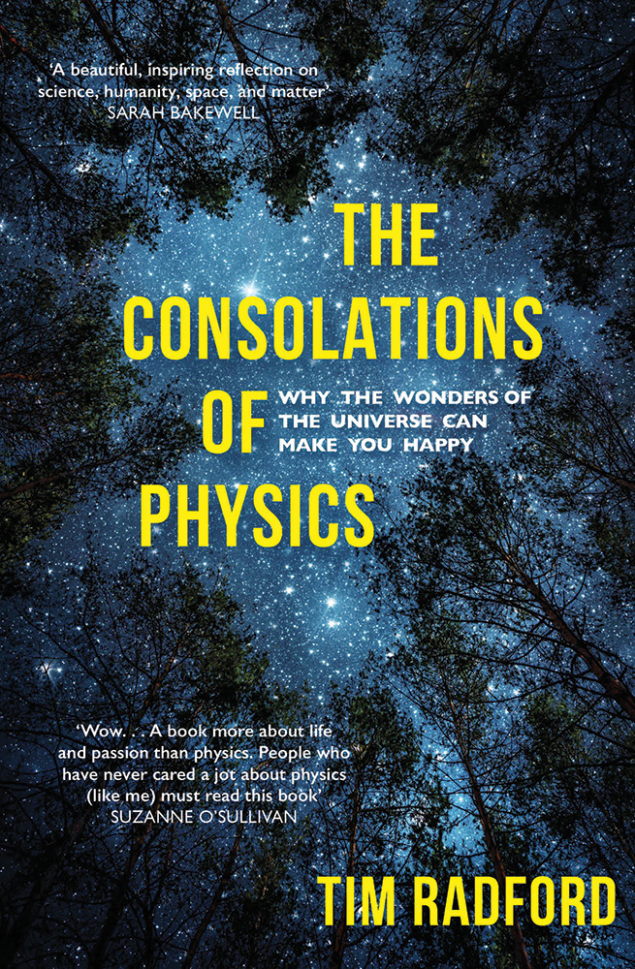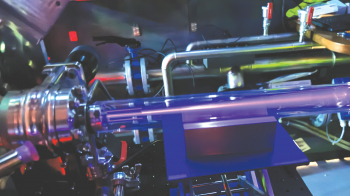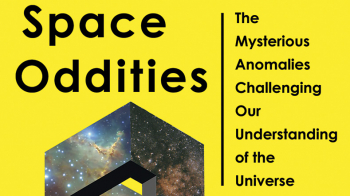The Consolations of Physics: Why the Wonders of the Universe Can Make You Happy, by Tim Radford, Sceptre

As someone who lives and breathes physics every day, I have to confess that when I curl up with a book, it’s rarely a popularisation of science. But when I saw that Tim Radford had written such a book, and that it was all about how physics can make you happy, it went straight to the top of my reading list.
Despite Radford’s refusal to be pigeonholed as a science journalist, insisting instead that a good journalist moves from beat to beat, never colonising any individual space, he was science correspondent for The Guardian for a quarter of a century. Now retired, he remains one of the most respected science writers around.
The book is a joy to read. More a celebration of human curiosity than a popular science book, it’s an antidote to the kind of narrow populism so prevalent in popular discourse today: a timely reminder of what we humans are capable of when we put differences aside and work together to achieve common goals.
Boethius, who took consolation in philosophy as he languished in a sixth-century jail is another recurring presence
The Voyager mission, along with LIGO and the LHC, serves as a guiding thread through Radford’s vast and winding exploration of human curiosity. Right from the opening lines, the reader is taken on a breathtaking tour of the full spectrum of human inventiveness, from science to religion, and from art to philosophy. On the way, we encounter thinkers as diverse as St Augustine, Dante and H G Wells. Boethius, who took consolation in philosophy as he languished in a sixth-century jail is another recurring presence, the book’s title being a nod to him.
We’re treated to a concise and clear consideration of the roles of science and religion in human societies. “Religious devotion demands unquestioning faith,” says Radford, whereas “science demands a state of mind that is always open to doubt”. While many can enjoy both, he concludes that it may be easier to enjoy science because it represents truth in a way that can be tested.
No sooner have we dealt with religion than we find ourselves listening to echoes of the great Richard Feynman as Radford considers the beauty of a dew-laden cobweb on an English autumn morning. “Does it make it any less magical a sight to know that this web was spun from a protein inside the spider?”, he asks, bringing to mind Feynman’s wonderful monologue about the beauty of a flower in Christopher Sykes’ equally wonderful 1981 documentary, The Pleasure of Finding Things Out. Both conclude that science can only enhance the aesthetic beauty of the natural world.
The overall effect is a bit like a roller-coaster ride in the dark: you’re never quite sure when the next turn will come, or where it will take you. That’s part of the joy of the book. There are few writers who could pull so many diverse threads together, spanning such a broad spectrum of time and subjects. Radford pulls it off brilliantly.
Someone expecting a popularisation of physics might be disappointed. Indeed, the physics is sometimes a little cursory. Yes, the LHC takes us back to the first unimaginably brief instants of the universe’s life, and that’s indeed something that catches the imagination. But that’s just a part of what the LHC does – it’s also about the here and now, and it’s about the future as well. But to dwell on such things would be to miss the point of this book entirely.
An elegant manifesto for physics is how the publisher describes this book, but it’s more than that. It’s a celebration of the best in humanity, built around the successes of CERN, LIGO and most of all the Voyager mission. What such projects bring us may be intangible and uncertain, but their results are available to all, and they enrich anyone who cares to look. Like any good roller coaster, when you get off, you just want to get right back on again, because if there’s something else that can make you happy, it’s Tim Radford’s writing.








